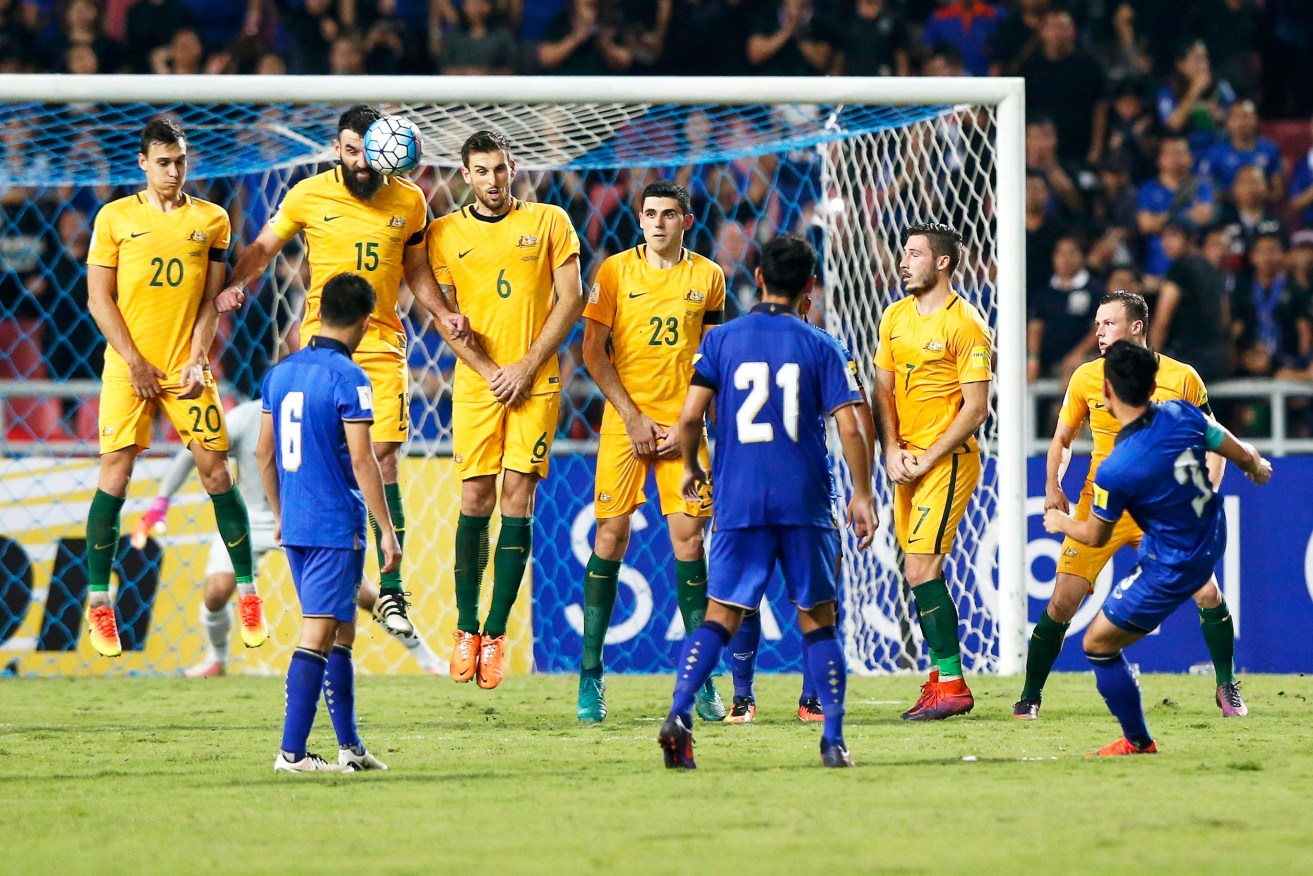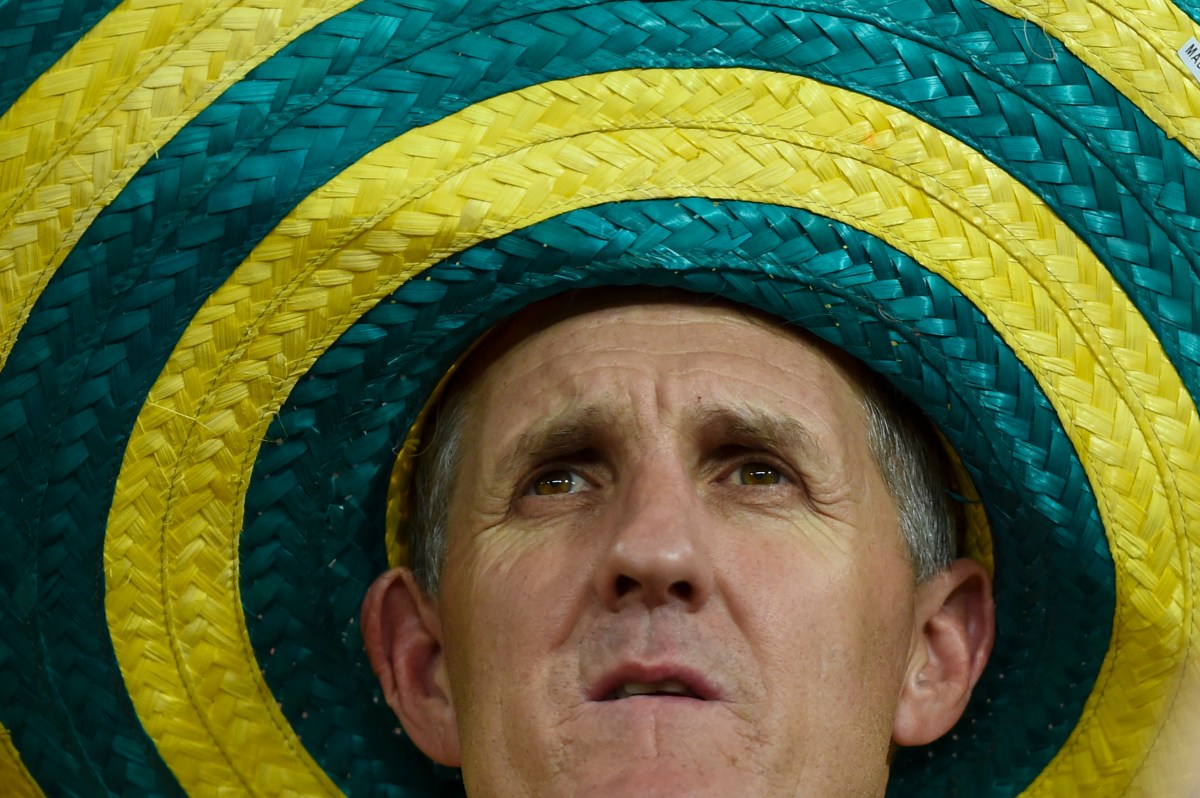The painful truth: our national team is in trouble
Forget the ‘glass half full’ prognostications and debates about the state of the pitch: Paul Marcuccitti argues it’s time to ask serious questions about the Socceroos. Ideally, before we find ourselves asking why we missed a World Cup finals berth.

The Socceroos were fortunate to avoid complete embarrassment against Thailand in Bangkok two weeks ago. Photo: RUNGROJ YONGRIT / EPA
Despite their last match being two weeks ago, there has been plenty of talk about the Socceroos in recent days.
First there was Thursday’s update of the FIFA Rankings which confirmed Australia dropping from 40th in the world to 48th (partly due to the failure to beat lowly Thailand).
Yesterday we woke up to the news that the Aussies will face Germany, Chile and next year’s Africa Cup of Nations winner at the Confederations Cup in June.
We also like marking great Socceroos anniversaries. Even though 16 November was the day after the horrible performance in Thailand, we still managed to celebrate our joyous triumph over Uruguay which occurred … err … eleven years ago.
Anniversaries can be good reminders and sometimes they’re informative.
But they can only inform us if we remember the bad ones too. The past weekend marked 15 years since the last time the Socceroos were eliminated in World Cup qualifiers. It was barely mentioned.
There have been better Australian sides but there’s enough quality in this one – it just isn’t being maximised
I wrote about it just 12 weeks ago because I was concerned about the current campaign for a spot in Russia for the 2018 tournament. Could we, for the first time in one and a half decades, experience that horrible feeling of knowing the World Cup finals will go ahead without us?
The Socceroos’ current predicament – sitting precariously in third spot in our qualification group after half its matches have been played – is worrying enough. But thoughts of the Confederations Cup can only add to the anxiety of those of us who suffered through the era that preceded John Aloisi’s famous penalty kick.
It’s a funny little tournament. You could argue it’s more exclusive than the World Cup finals because to get there a team has to be either a continental champion (Australia qualified by winning last year’s Asian Cup), the world champion or the host nation.
But it simply doesn’t have the same prestige.
In 2014 I visited the magnificent Museu do Futebol in São Paulo. One of its first features is asking the question “Why did we win?” or “Why did we lose?” for each World Cup since the competition’s inception (which says a lot about Brazil’s expectations). The museum’s dedication to the tournament would be enough to exhibit on its own.
There is comparatively little displayed for the Confederations Cup, yet Brazil has dominated it with four wins from its seven editions (including the last three).
It’s also fashionable to say that the Spaniards won three consecutive international tournaments from 2008 to 2012 (two European Championships and one World Cup), completely ignoring that they were knocked out of the 2009 Confederations Cup by USA.
Back here in Australia, the Confederations Cup was somehow both encouraging and frustrating. It used to be easier to get a ticket as, until 2005, the Socceroos simply had to win the Oceania Nations Cup.
And then we watched them register wins over Mexico (in 1997 and 2001), Uruguay (1997), France (2001) and Brazil (2001).
Which was lovely but qualification for the World Cup finals remained elusive. The 1997 Confederations Cup was especially bittersweet. Australia – remarkably – made it all the way to the final. But it was played only weeks after the infamous MCG match against Iran which cost the Socceroos a place at the 1998 World Cup in France.
Did the Confederations Cup confirm that Australia had a decent side that just blew it against Iran? Or did it show that the big countries didn’t treat the tournament as seriously as other international competitions? (Or a bit of both?)
What was certain was that it was maddening knowing that the Socceroos were probably good enough for the international stage without being on the one we truly wanted.

A pensive Australian fan watching on as the Socceroos took on Chile in the 2014 World Cup. They will face Chile again at next year’s Confederation Cup. Photo: Lukas Coch / AAP
Australia’s World Cup era of the last 11 years began just a few months after the 2005 Confederations Cup – the last one to feature the Socceroos.
When the 2017 edition is held, Australia will have played eight of ten matches in their current World Cup qualifying group. The Socceroos’ fate isn’t likely to be known at that point but, without good results in their next three matches, they could be in deep trouble.
And frankly our national team is in a bit of trouble now. The group has reached the halfway mark and Australia sits third – a point behind Saudi Arabia and Japan, and just ahead of United Arab Emirates on goal difference. (Remembering that only the top two qualify for Russia 2018, the third team has another route but through two sudden death home-and-away playoffs, and fourth and below are out.)
Even more worrying is how badly the team is playing. Despite winning two and drawing the other three matches in this group, only one performance – the win in United Arab Emirates – was particularly good.
Yet most of the commentariat still seems to be a bit complacent. Aussie pundits have been quick to point out that three of the remaining five games are at home and that teams like Saudi Arabia and UAE tend to be poor travellers. And before the horrid performance in Bangkok, we kept hearing that we’d get six points from the two matches against Thailand…
I have no doubt that the players are good enough. There have been better Australian sides but there’s enough quality in this one – it just isn’t being maximised.
We’ve seen the players deployed in unsuitable formations, chaps being selected when they’re not getting match time with their clubs, and failure to adapt to opponents’ differing game plans.
And this ridiculous obsession with the quality of playing surfaces has to end. Newsflash: qualifiers will continue to be held on pitches that don’t resemble billiard tables. So perhaps get used to negotiating those bumps instead of complaining about them.
Socceroos coach Ange Postecoglou has barely been questioned throughout this downturn. It’s understandable given what he’s achieved over the last three years: regenerating the team, better than expected performances in the 2014 World Cup finals, and winning the Asian Cup.
But 2017 will be a defining year for the Socceroos and, given the shaky performances of recent months, embarrassment might be more likely than the celebration of another successful World Cup qualifying campaign.
And then the Confederations Cup – despite all the fanfare that accompanied its draw yesterday – will go back to being the tournament that mocks us: the one we grace when the big stage we crave is out of reach.
Paul Marcuccitti is a co-presenter of 5RTI’s Soccer on 531 program which can be heard from 10am on Saturdays.




